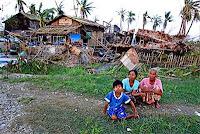Stop pushing back Rohingyas to Burma: Protect the Rohingya refugee boat people
By Vang i Valdres
Norway, 01 March, (Asiantribune.com): In a statement released by Rohingya Human Rights Council based in Norway has said “We are appalled to know that the Association of Southeast Asian Nations (ASEAN) has decided to send hundreds of Rohingya boat people back to military-ruled Burma. Meeting at its annual summit, the 10-member bloc agreed to compile and pool information and interviews on the Rohingyas, who washed up on the shores of Thailand, Indonesia and Malaysia having fled oppression in Burma."
On the other hand, the Thai Foreign Minister Kasit Piromya said Burma is ready to take back the Rohingya migrants if they can prove they are of Bengali descent.
The statement released by the Norway based Rohingya Human Rights Council further said, "The Rohingyas have been fleeing Burma because of extreme human rights violations unleashed by the Burmese military regime to annihilate the entire Rohingya populations from Arakan which is a state under the Union of Burma. They have been subjected to severe persecutions including denial of citizenship, a ban on marriage without government permission, severe restrictions of movement, religious persecution, extortion, land confiscation and restrictions on access to education.
The Rohingyas are not the descendants of the Bengalese. They are an indigenous group of Arakan where they have been living since the 7th century.
These unfortunate Rohingya refugee boat people have already suffered a lot. They have come back to life from the mouth of death after passing many days in the deep sea without food and water. And hundreds of them have perished in the deep sea after the Thailand's navy has left around 1,000 Rohingya refugees adrift in the ocean in boats without engine or food or water.Under the above circumstances, the decision of the ASEAN to send the Rohingya refugees back to Burma is a clear violation of human rights and international law for refugees.
So, we fervently appeal to the ASEAN nations to stop push back of the Rohingya boat people and to grant them asylum.
We also fervently appeal to the international community, the world bodies including the UNHCR to stop push back of the Rohingyas to Burma and to
take necessary steps for the protection of the Rohingya refugee boat people.
- Asian Tribune -














